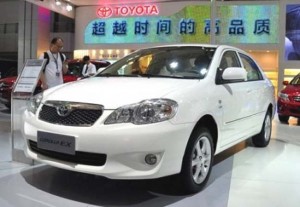If China is essential to its future then Toyota may be facing some serious trouble. The Japanese maker appears to be losing momentum in what has become the world’s largest automotive market, in part due to a series of recalls and other safety-related problems.
China’s General Administration of Quality Supervision, Inspection and Quarantine said in a statement that a series of problems, including faulty brakes and broken drive shafts in Toyota vehicles led to accidents that “caused many casualties.”
The agency didn’t say whether it had asked Toyota for a recall and didn’t give details about the accidents in the statement. However, the parts cited by the Chinese have been identified as a problem in recalls in other markets around the world, notably in the US.
In its report, the safety agency said Chinese-made Toyota models, including the Camry sedan and the Reiz compact, as well as the imported Land Cruiser Prado sport-utility vehicle, were involved in the accidents. No other automakers were named in the statement.
The latest problem comes a month after Tianjin FAW Toyota Motor Co recalled 33,809 Corolla Ex vehicles in China. In February, China asked Toyota to explain why it wasn’t included in a separate global recall, the Xinhua News Agency reports. Chinese regulators wanted Toyota to make sure Chinese consumers’ “safety and legal rights” were protected.
“The local unit is currently investigating the case,” said Keisuke Kirimoto, a Tokyo-based spokesman for the automaker.
“The reported problems seem to point to the same parts that were found to be malfunctioning when the recalls in the United States occurred, and this may turn out to be crucial for Toyota,” Tatsuya Mizuno, director of Mizuno Credit Advisory in Tokyo, told wire services seeking comment on the recalls.
Additional safety-related problems in China, he added, “could damage their reputation and further depress sales for them”
Toyota has been struggling in China, as its sales have fallen more than 14% so far this year, while the Chinese auto market overall is up 3% for the first eight months of 2011 despite the end of government subsidies and the imposition of government quotas on new-car sales in Shanghai and Beijing.
Embarrassingly, Nissan emerged as the largest Japanese automakers doing business in China surpassing both Toyota and Honda.
Toyota has blamed the decline in sales on the March earthquake in Japan, which has resulted in a shortage of parts at its Chinese joint ventures. The same situation crippled factories in North America and Europe. The maker says its worldwide production network is largely back up to speed now, so the coming months will test whether the maker can regain its momentum.
But Japanese brands, in particular, often face challenges in China, where consumers still recall the brutal actions of Japanese occupiers during World War II, Sino experts caution.
China, meanwhile, is stepping up efforts to control vehicle quality as rising automobile ownership leads to more road crashes. Traffic accidents rose 36% to 3.9 million in 2010, according to the Ministry of Public Security, and for those 45 or younger, they have become the leading cause of death.
And a recent study suggests that, if anything, the government may be routinely understating the problem. While police statistics showed a 27% drop in traffic fatalities between 2002 and 2007, the study found that traffic-related deaths were actually up 8%. And while police reported only 81,649 fatalities in 2007, the number was more likely 221,135 based on official death certificates.

